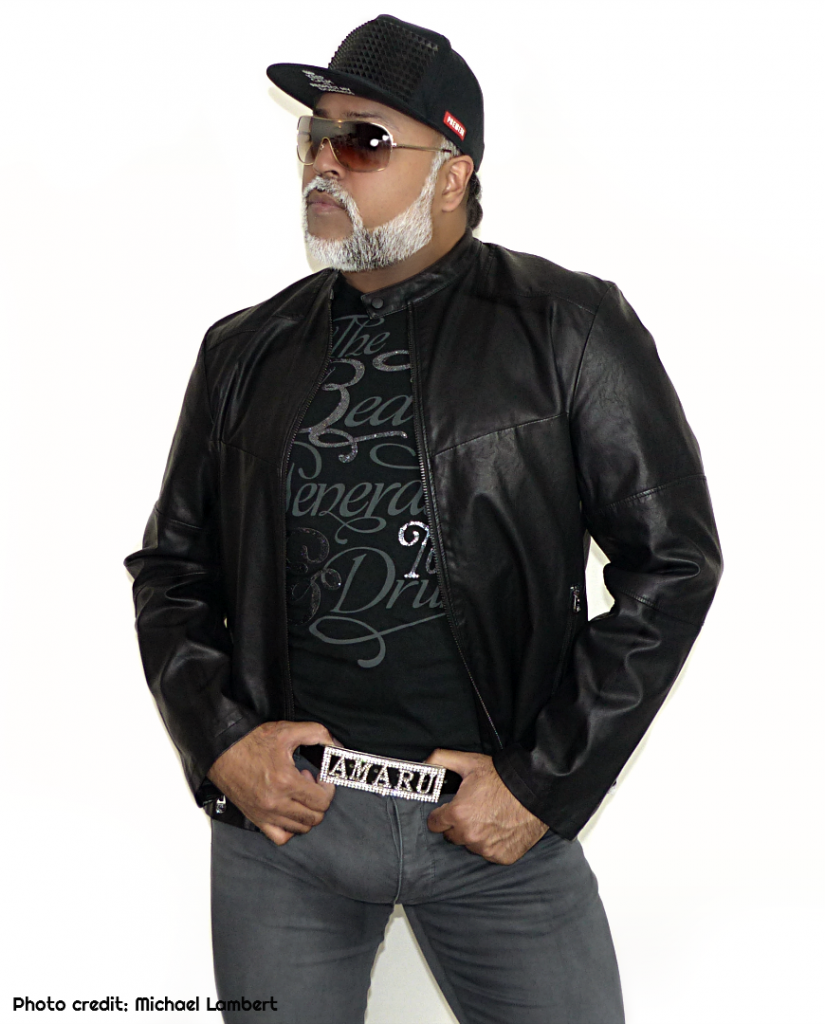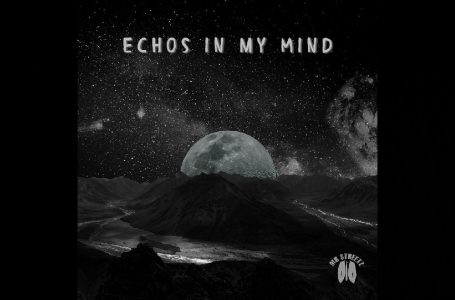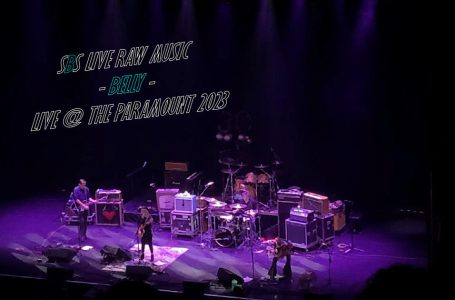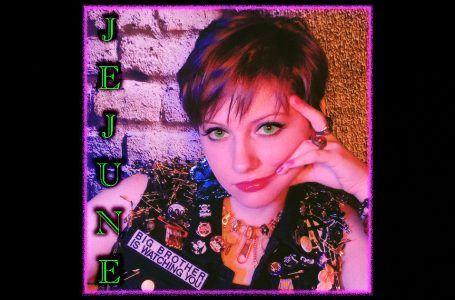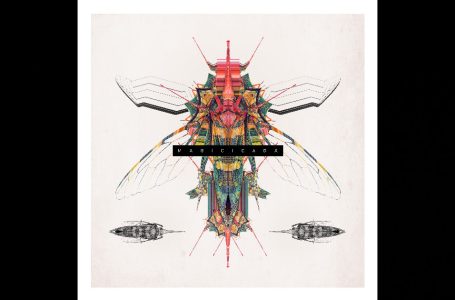Amaru
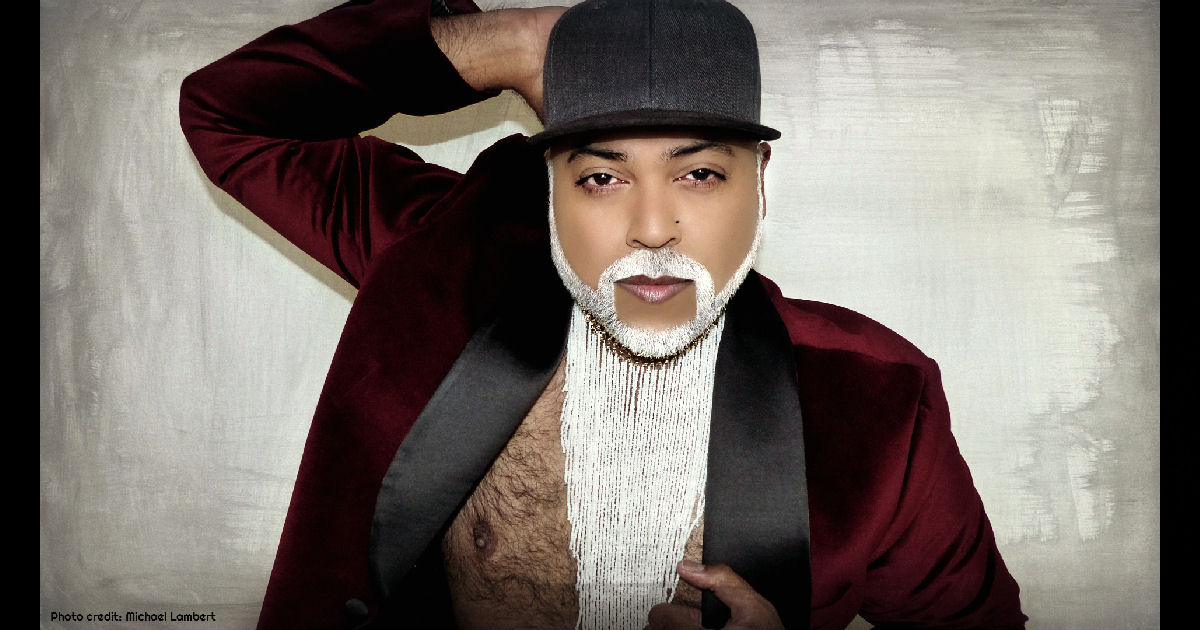
Amaru Interview
SBS: Amaru! Dude! Thanks so much for taking the time to answer a few questions with us here – completely appreciated. I’m always looking forward to finding out more about an artist like you with such a diverse sound in their music. Let’s get everyone on the same page to start with – what would you say sets your sound & style apart from the rest of what’s out there in the music-scene right now? What are the defining attributes of the music you create & what can people expect from Amaru?
Amaru: Well, first of all, thank you for having me, the pleasure is mine. What sets me apart is that I don’t sound or look or write like everybody else out there. I’ve never been one to follow, not that I consider myself a leader, but I have always marched to my own beat. A lot of singers these days jump on whatever is hot. Instead of exploring their own creativity, they try to mimic other singers. There’s this song I heard on the radio a while ago and I was willing to bet all my money on it… I was certain that it was Rihanna… oh no, it was not… Same thing with male singers… they all wanna sound like Justin Bieber… And what I also find very astonishing is that the audience is very easily satisfied… “Oh, that’s a nice sounding tune, we like it”… and I am on the other side of that conversation scratching my head in disbelief … Music has been very boring for a number of years now and people don’t WRITE about meaningful things anymore. I get it, you wanna write a love song… I love love… But even that gets boring after a while, especially when the musical arrangement doesn’t make sense… And how many songs do I have to be subjected to that talk about dancing… or going to the club… or fancy cars… or expensive jewelry… And don’t get me started on lyrics that are not cohesive… just a couple of hollow phrases that people throw together, set some kind of a beat to it and pass it off for music… When Cher used that vocoder in her hit song “Believe”, that was a novelty… but don’t these people see that after all these years, that has been done before, one and two, it sounds boring and monotonous today, not to mention very unimaginative. Now, I am in no way, shape or form pretending to be the next big thing in music, but my lyrics tell a story, they are not scattered words put together to make a quick buck. In addition to that, I don’t look like your typical pop star and that’s just the way I like it. As mentioned earlier, I don’t like to be like everybody else, because simply put I am not. I am an individual and I think it’s very important as an artist to have that reflect in your work.
SBS: You’ve just released your debut album, Champagne Attitude, this year! That’s EXCITING brother! Always a great time in a musician’s life when those songs finally get out there into the world isn’t it? They say you get a lifetime to make your first record and two weeks to make your second. You took your time with getting this debut out there…I checked out the documentary on the making of the album and it detailed how you had trouble trusting producers with your material & finding the right place to make it all happen. For those musicians out there that have never stepped foot in a studio or dealt with a shady producer of some kind yet (we know they will eventually!) – what kind of warning signs were you seeing that you could point out for others to avoid? What should artists/bands be on the lookout for? What should they expect? Ultimately, what was it about the music or yourself as an artist that you were looking to protect and why was that so important to you both personally and professionally?
Amaru: Where do I start… In 2007 I went to Chicago to work on, what I though was going to be, my first album… I got in touch with someone on Myspace who was managing a couple of very famous stand-up comedians. This person now introduced me to a high school friend who was a musician and whose music production credits included big time Hollywood films… Now, I’ve never been one to be blinded by such credits, but it did make me feel like I was in good hands, especially considering that we had a production agreement drawn up which would protect us both. To make a long story even longer, on the day that I arrived in Chicago things went awry. As I was sitting in the car with said “producer,” while parking the car this individual had the nerve to ask me for some change for the parking meter… I snapped, because not only did I just pay you for the project, you were an hour and a half late picking me up from the airport AND you want change for the meter…??!! Anyway… moving into the “studio”, which was an apartment, and I use that word very loosely… His equipment was from the early 1800’s to say the very least and he never wanted to work on the music during the day, but always at or after midnight… There are a ton of other things that were absolutely not up to par or not per our agreement and I can show you photos and video of my living arrangements in Chicago, but I’ll spare you those details. Let’s just say that on the same day that I arrived, I wanted to leave. And I didn’t commit to the project either because of all of the hardship and difficulty working with this person. I basically accepted that this was not going to work, so why bother… I did manage to get at least one good song out of the project, which was my debut single “Put Your Hands Up.”
“AMARU: The First EP” was my first attempt at recording and while it was my first release on my own label AMARU MUSIC, the EP didn’t fare well, mainly because the songs were not good enough and I simply did nothing to promote the record. I couldn’t, because I was treated horribly by this person, I wanted to distance myself completely from him and to this day I still don’t have my master tapes…! Talk about your RED FLAGS! Anyway, red flags that newbies need to look out for? Plenty! First and foremost: have you signed up with a PRO (such as ASCAP or BMI)? Did you check the producer’s credentials? That sort of thing… I did get my feet wet when I went to Chicago to work on these tracks, I have to say and it did prepare me for what was to come. I am now a thousand times more hands on when it comes to my music and what I’ve noticed is that a lot of industry folks don’t really like that. The less you know about the business, the more they “like” you. But listen, you have to be hands on, because these are your creative works! There’s a lot of grey matter in the business aspect of the music business and if you’re not educated on that, people will take advantage of your ignorance! More red flags? I remember going to a studio closer to home to work on my song “The One” and the first thing the “producer” or studio technician asked me was money… I said that’s not how things work, you provide a service, you sent me an invoice and I pay accordingly. RED FLAG! I wanted to sign with a booking agency in this country. I was invited to a meeting with them, we had some coffee at a lunchroom and these folks wanted me to relinquish all my passwords to my social media, because they were going to “handle things from now on” and what not… Oh, and they were also going to advertise other acts on MY social media platforms… NOW… I speak 7 languages, I won’t repeat here what I told them then, but trust and believe, it wasn’t pretty. In conclusion what I can advise is: do your homework at all times! If things sound too good to be true, most of the time they are. There are a lot of charlatans and sharks in the music business and very few who are genuinely passionate about making and performing music… Learned that the hard way…
SBS: I absolutely loved listening to the story you told about meeting the producer that you did end up working with, Marcel. To hear about the different experiences you’ve already been through…and then to have this guy that you’re meeting for the FIRST time basically tell you that you’re about to jump right into the studio booth after playing about thirty-seconds worth of a demo – I mean…that some serious cajones, know what I mean? That would have blown my mind as an artist! But at the end of the day – there’s a confidence there that can’t be denied that’s on display immediately too – obviously in his own capabilities and knowing what he can bring to a song production-wise, but also in YOU as an artist as well. Give us an idea of what it was about Marcel that got you to go into the studio on that first day – what was it about the guy that made you know that was going to be the right choice & the right time? And conversely…just cause I’m curious as to what you might think…from your perspective, what was it that you think made Marcel want to work with you and your music?
Amaru: I am telling you… I was scared as hell walking into that booth that day, not prepared to record any vocals whatsoever… He just saw the potential of the demo, I guess and he wanted to start working immediately. As I stated in the “Making Of” documentary, it was exactly one year to the date that him and I got back in touch, so I thought it was kismet. And after my long search of finding someone who was willing to go the distance with me musically, someone who understands my musicality, someone who builds you up instead of tearing you down, someone who thinks WITH you on certain production decisions that you have to make on your own, someone who gives you constructive criticism… before I met Marcel and started to work with him, all of these prospective musical partners failed to possess these qualities. In addition to that, when I arrived at Marcel’s studio, an ACTUAL studio and not some living room turned into a recording studio, he was very gracious and very hospitable. He was honest and upfront with me about the way he works and he understood where I was coming from. And since he’s a singer and a musician himself, I think his passion for the craft made him decide to work with me that day… and I’ve been going back ever since… I love the man’s work and his work ethic! Not to mention the fact that he’s a great husband and a great father of two! And he’s a beast on that Ibanez!
SBS: More positives! What was your favorite memory from the recording of Champagne Attitude? What did you learn from this particular experience that you’ll take with you into the next recording session? Aside from having Marcel being prepared to record you…how did you personally prepare for your own performances? How do you know when it’s ‘go time’ and you’ll be at your best – is that something you can feel prior to stepping into the studio or somehow know beforehand – or do you find that out right in front of the microphone when it’s actually happening?
Amaru: Wow… I have so many favorite memories of this whole project… it’s hard to pick one… But what I can say is that we have never had any disagreements whatsoever… There always was and still is a certain amount of mutual respect for each other’s creative and artistic input. He is a more seasoned musician than I am, so of course, when it came to that aspect of the production, I relied on him a little more. I know what I want my music to sound like and I am very clear in that, but I always leave room for the artistic and creative interpretation of the person that I work with. If you can’t do that, what’s the use of employing someone’s services… you know? And to answer the second part of your question… I always prepare at the house, in fact I prepare as I am busy writing the (new) song. When I’m satisfied with my lyrics and basic musical arrangement, most of the time I will record a basic vocal on my own computer to practice with. I also work on the backing vocals during this stage. By the time I’m good and ready to take the demo to the studio, we can get straight to work without wasting too much time. And even after the first recording session sometimes when I go home and listen to the playback, I notice things that I need to change, you know?
SBS: You mentioned ‘artistic integrity’ at one point in the details about the making of Champagne Attitude and I had to pause for a second to write this question out. You know how hard I’ve tried to get artists/bands to define integrity? I’ve honestly put it out there to more people than I can count at this point…and you know what the most common answer to that question actually IS Amaru? I’m not even kidding here – it’s “I don’t know.” After listening to your thoughts, I felt like you’d feel like I do whenever I read that response…which is, ‘how could you not?’ – I think artistic integrity is one of the most important things that we have as creative-types! Whether it’s words, music, paints, mechanics, whatever it is or however you define your art – it’s about what YOU bring to it and not about worrying about doing what anyone else has done before you & what impact that may/may-not have on anything you’re doing yourself. It’s about keeping that genuine sincerity of your own expression intact, is it not? How would you define artistic integrity Amaru – and why is it an essential part of being an artist, to you?
Amaru: Artistic integrity to me is maintaining what you bring to the table artistically and creatively and convey that to the person or persons you are working with, while leaving room for their own creative interpretation and artistic expression. Meeting each other half way is key, which is why it’s very important to find like-minded individuals to collaborate with. Some people are very headstrong when it comes to their creative works and it’s very difficult for them to allow other people’s interpretations of said works… But as I mentioned earlier, why work with someone when you won’t allow them to share their creative input, which in turn can help your product become even better? Maintaining my artistic integrity is important to me, because at the end of the day my name is on the record or on the poster at the venue, but at the same time I am not only the executive producer or lyricist or artist, I am also the manager, the label exec and publicist, so I have to think like all of those entities at all times. And holding on to what I believe in artistically will only work for so long… I’m not an island and I cannot produce music on my own. I need like-minded people to work with me to create a product that we’re both content with, so nobody’s artistic integrity is compromised!
SBS: How about the power of positivity eh brother? I liked that you spoke about how Marcel took that time as a producer to pump you up and get you believing even more in yourself & your abilities. Like you’ve experienced yourself and describe, it can definitely go both ways – but in my experience, and again, sounds like in yours too, it’s positivity that will always yield the best results. That being said, criticism is equally important to an artist’s growth & evolution as well…even all those horrible situations you described in previously taking your music to other producers, all those events made YOU a better artist and certainly a wiser one by the end. We’re all the sum of our experiences to some extent…it’s just up to each of us as individuals on how we want to let those experiences drive us forward. How do you handle criticism Amaru? How do you know when someone is making a valid point about your music that could potentially help you versus an invalid point that’s probably just personal preference of some kind? As an artist, do you find that criticism has become something to value or something to fear? How does criticism contribute to your evolution as an artist – or does it?
Amaru: I think positivity definitely plays a key role in these types of settings and like I said, Marcel will highlight your ups to a point where you forget about your downs, because he will never be blunt or rude about a vocal that is off key or timing issues or what not. He will simply say “You know what, I think you can do better than that”, which works perfectly for me. I am not afraid of anybody’s criticism, as long as you know how to form a complete sentence in your native language explaining to the world why you think my music is good or why it isn’t. You always see these folks online in their videos stating that “this movie sucks” or “his new album is terrible” or they attack your physical appearance (which is what my song “Gentle Giant” is about, by the way!). That type of criticism is useless to me, because most of the time it’s a personal issue that these people (may) have, but they’re incapable of addressing it or voice it, because of their limited vocabulary, I don’t know. But what I do appreciate is when people can substantiate their criticism. You can say anything you want to anybody in the world… it’s your delivery that will make a lasting impression. I don’t think people’s criticism of my music helps me evolve as an artist per say. I do take into consideration their input, but at the end of the day I have to feel good about the music I release, first and foremost and everybody that wants to join me on that band wagon is more than welcome to do so. You can’t please everybody and that applies to singers, actors, housewives, politicians…
SBS: Alright…so…hang on a second here…something just caught my attention in the making of Champagne Attitude again. You mentioned that “I’m The One You Need” was the first song released on the Amaru Music record label…which was started in 2007…and…AND? And like…hold up a second here! Eleven years that Amaru Music has been around and waiting for its own potential superstar & founder to get that album out? There must be other stuff happening with the label as well I’m assuming? Otherwise you’ve got a name and a nice paperweight waiting around for a moment in the future that may/may-not ever come right? Thankfully in your case, it did, and that label got put to use! I’m just giving you a hard time of course Amaru…it all adds up and makes perfect sense to me, no matter how long it takes…bottom line is, you got to where you wanted to go – or at the very least, you’re on your way. But for real though, I am curious – are there other things going on with Amaru Music outside of your own music or plans for there to be in the future? What’s the full scope of what you’re looking to accomplish or achieve by having your own label?
Amaru: Welllllllll… the thing is, when I went to Chicago in 2007 to work on some music, as mentioned before, that first EP was the first release on AMARU MUSIC… the first DIGITAL release mind you. I did have a couple of CD-R albums made, less than a handful, but I don’t consider that EP an album… In addition to that, I had very little knowledge about the business aspect of show business, so I just did what I thought was and felt good. After my misadventure in Chi-Town, I decided to educate myself on matters that desperately needed my attention, so hence. In between the release of singles, I did have a ton of acting jobs that kept me busy, so that’s another reason why it took me so long to release new music. And speaking of acting projects, while I have done some international commercials before, I will star in my first international feature film soon. We will commence to shoot my parts in August of this year. My plans for AMARU MUSIC for now are simply to have a vessel to release my own music. Of course, I’m not sure what the future holds, but I’m not excluding signing new acts to the label at some point… who knows!
SBS: I have to applaud you for putting the behind-the-scenes/making-of Champagne Attitude out there my friend – I think that was a bold & smart move on your part. Not only do you describe being vulnerable as an artist at points in your words, but you show us some of your earliest studio footage, which for most artists out there, would be the most vulnerable they could ever be and a terrifying concept to put it out there into the world for all to see. I think it says a lot about the courage you have as an artist – and you echo that in your empowering statements about where you’re at today in your confidence-level and self-esteem…you’re ready to take on the world and it’s inspiring to hear. You’re leading by example and embracing life as an artist – and I think a ton of people out there will connect to that sincerity & passion you so clearly possess. Is there an aspect of this newfound confidence that you have personally, that you’re seeking to pass on to others somehow through the music you make? It all seems to come from a real place of honesty…you’ve got an endearing charm that I know people will dig – but ultimately, it sounds like you’ve got a semi-plot going on underneath it all to inspire others – yes?
Amaru: LOL! Listen, I am not a vocal powerhouse or a singing prodigy. I sing and I sing well, I manage the talent that I was blessed with to the best of my ability. And that’s what I wanted to share with the folks , that’s why I included those clips in the documentary. I wanted to give an honest portrayal of the production process without too much fluff… and as you stated, people do respond positively on that, because they see the honesty and fun and the work in put in! I work with what I have and unlike some, I’m not here to “fake it till I make it”. I am who I am and I work with what I have and that is not only relevant, it is sufficient. And speaking of my self-esteem and confidence… it took me decades to accept ME for ME! Coming from a very macho culture, I was picked on severely by many, even family members. I was always the chubby kid with the “weird voice”, I was apparently never good enough, in their opinion. But once I came to the realization that I can only be ME and nobody else BUT me, that’s when the change started. I stopped living for people, I started to live for ME… and some people couldn’t handle that… some still can’t, but hey, that’s their issue, not mine.
SBS: Wide-open question for you Amaru…it relates back to artistic integrity I suppose… When is it okay to compromise as an artist – or is it ever okay?
Amaru: I think that’s a personal choice… as stated previously, if compromising your artistic integrity will generate a product that is even better, why not… I personally choose to work with like-minded people who feel the same way I do about the works we’re creating, I leave room for their interpretation and all of that, but as the final decision maker I have the last word. And most of the time it is a merging of all of our creative talents, I’m not an ogre where that is concerned!
SBS: What I really enjoyed about the in-studio footage of you throughout the making-of Champagne Attitude was how much it seemed like YOU completely understood what you were looking for in your own sound. Whether that meant another take in the booth, or listening back to it, you’ve definitely got a solid grip on what you’re looking for with the music you make and how you want it to sound. So what’s important when it comes to an official tune from Amaru? What does a song HAVE to have in order to make the grade, both musically and vocally, when it comes to the songwriting aspect? When you’re listening back to a song and it doesn’t hit the mark that you’re looking for – how do you know when to go back and rework it, or toss it all together? You know what I mean? There has to be something specific in the material that you’re consciously or subconsciously checking to make sure that the music you make has in order to want to put it out there into the world & know that it represents you entirely…what might that be?
Amaru: I started to write lyrics at the age of 14… some of these lyrics did make their way to the album, mind you, but more about that in a minute. When I moved to Europe in the early nineties, I decided to pursue my artistic life and songwriting was also something I continued to do. Before working on “Champagne Attitude,” I already had at least 35 songs on file that I wanted to include in my prospective debut album. But some songs were so dated, I couldn’t use them anymore, unless I re-wrote them. My outlook on life had changed, I had evolved as a person, I was now an adult man, all those things forced me to write new songs to be included in the album. And you’re right, I am directing the hell out of those recording sessions! Not because I am such a “boss,” but I am on the clock! Time is money and I have neither to spare, you see. So that’s why I am prepared when I go to the studio to work on my music. Now, when I write a new song, it mostly originates from a thought or a couple of words or a phrase that I have heard somewhere… or sometimes even a melody that is stuck in my head. I sit myself down to write my lyrics, I work on the arrangement, I usually work with a basic drum loop for timing and take it from there. And I always try to write about something meaningful, something that could be interpreted in different ways by many. For instance the song “Never”… which is about my late maternal grandmother, but many people think it’s about a relationship that has ended… in essence it is, but not in a romantic sense of the word. Rule of thumb in writing is to write about what you know… and that’s what I do, which reflects in my work!
SBS: Now that Champagne Attitude is officially out there and available to the world, I suppose it’s only natural to ask what comes next? What does the future hold for the music of Amaru and where do you go with it from here?
Amaru: Yes, the album is out there for the people to listen to and I can’t change anything about it anymore! Not that I would want to, because I stand behind it 100%! I am very proud of my achievements and while it is very difficult to get my foot in the door most of the time, it doesn’t stop me from trying! I cannot sit still and watch the world go by… Life is for the living and I am LIVING my life, both my artistic life as well as my normal, boring everyday life! Musically, I have just started the international radio promotional campaign for the new single “Low On The Dough (Radio Mix)” via DMDS (Digital Media Distribution System), so hopefully the big Adult Contemporary radio stations will pick it up… fingers crossed! In addition to that I hope to put together a little promo video for that single soon. I am also working on the RAP remix of “Champagne Attitude”, which sounds completely different than the album version! Lyrically this remix picks up where “Low On The Dough (Radio Mix)” left off. I also hope to release a simple promo video for that single when the time is there. And other than that I will continue to promote the album, because it deserves everybody’s full attention!
SBS: Many thank-yous to YOU my friend – again, I completely appreciate you taking the time to talk to us through this interview and share your thoughts with the people out there! I wanna make sure you’ve got as much of a chance as possible to say everything you would have wanted to…and the best way I can think of aside from all those rambling questions and questions-within-questions beforehand is to give you our customary ‘open floor’ here at the end to say anything you like or mention anything else that you would have wanted to bring up throughout the interview. Wishing you the best of success with your debut record Champagne Attitude and looking forward to hearing about how it leads you to a second album in the future my friend. The floor is yours Amaru – thanks again!
Amaru: Well, thank YOU for your time and hopefully your readers will now have an impression of the man behind the album. I’ve been to Canada before, but this was way before my album was released. I’m not a mainstream artist, but what a way to introduce Canadian people to my music… through you!
So: thank you!
Find out more about Amaru at the official website: http://www.amaru.nl
We’ve got questions, you’ve got answers – be our next interview guest at sleepingbagstudios by clicking here!


